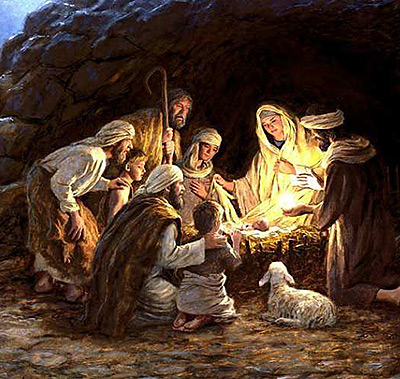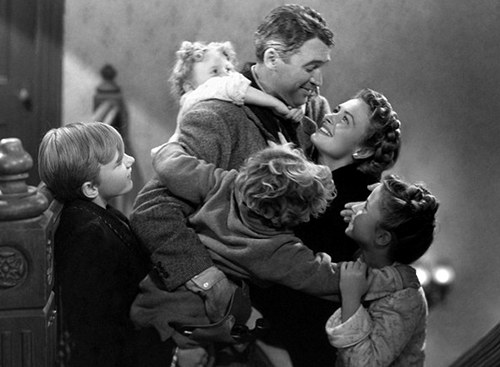
As the recently elected new GRA President, I want to extend a happy greeting to you on behalf of our organization at this “most wonderful time of the year!” We count it a privilege to work alongside all of our grassroots friends across the state. Although we’ve changed a few things on our leadership team, we want to renew our commitment to you to continue to stand for the American principles of the Republican Party which have made our nation great.
The Christmas season is a good time to consider how we should reform the political landscape in our state. The themes and archetypes of the season depicted in the popular stories, songs, and movies are rooted in the original historic story of Christ’s birth and the circumstances surrounding it. Here are some lessons we can learn from them:
1. Don’t Be a Herod / Grinch / Scrooge / Mr. Potter

All the classic Christmas fiction seems to have a hardened bully character with a bad attitude who opposes the spirit of the season. Whether the character goes by the name of “Scrooge” or “Mr. Potter” or “the Grinch,” they ultimately hearken back to the curmudgeon of the original Christ’s birth story: King Herod. At the state capitol in Atlanta, we’ve had our share of real-life characters of this sort. Sometimes they come under the label “Democrat” and sometimes by the label “Republican,” but they all have some things in common such as a lording of their human power over others, a closing of their ears of compassion to needs they have the jurisdiction and power to alleviate, and a rejection of the significance of Christ’s coming in their lives.
King Herod in the Bible was so desperate to cling to his material political power that he became notorious for murdering a whole generation of babies in his land in his attempt to kill Christ, and today we also have politicians complicit in the murder of thousands of babies—and they force you to pay for it with your tax dollars. In fact in Georgia since Dobbs, there are now more abortion murders committed at clinics each year than there was before!
The Herod-type political characters are not only cold to the murder of those who cannot vote, they’re hard hearted to the stealing of millions of dollars through socialist programs, they turn a blind eye to evidence of stolen elections, and they don’t care about the dissolution of the nuclear family.
In some of the Christmas fiction stories, the Herod archetype character experiences redemption (such as Scrooge or the Grinch). We observe that kind of thing in the Bible when the persecutor Saul of Tarsus had his Damascus Road experience and became the Apostle Paul. But in the original Christ’s birth story, King Herod sadly never experienced any change of heart. Only judgment.
The Bible says that Jesus is the “King of kings” and “the government shall be upon His shoulders” because earthly magistrates are accountable to Him, and they must learn to live in light of that chain of command:
Be wise now therefore, O ye kings:
Psalm 2:10-12 (AKJV).
be instructed, ye judges of the earth.
Serve the Lord with fear, and rejoice with trembling.
Kiss the Son, lest he be angry,and ye perish from the way,
when his wrath is kindled but a little.
Blessed are all they that put their trust in him.
2. The Solution to the World’s Problems Is Not Statism
We all agree there are some significant problems in this fallen world. But to some people, every problem requires a new government program or agency, more regulations and bureaucracy, more centralization of power, more taxing and spending. Less freedom. But the solution God offered to the world’s problems when B.C. turned into A.D. was not more statism.

God’s gift came wrapped as a humble baby in a manager. He taught that God’s solutions are inside-out, not coercively forced outside-in by the state from the top-down. Indeed, the vast majority of humanity’s problems cannot be effectively solved by civil government. Only God can solve our most basic problems, and His Word tells us that He often more effectively works through individuals, families, churches, and charities than he does through civil government.
The Second Humanist Manifesto states:
“[W]e can discover no divine purpose or providence for the human species. While there is much that we do not know, humans are responsible for what we are or will become. No deity will save us; we must save ourselves.”
If you read the rest of the Humanist Manifesto, you’ll observe that the result of this premise (that there is no God) leads them to propose that the only way for humans to save themselves is to promote more globalism, more statism, more abortion, the breakdown of sexual boundaries within the context of the family, more social engineering, more civil government theft of your civil liberties and finances. In essence, the planks of the Democrat Party platform.
In virtually all the classic Christmas stories, however, just as with the original Christ’s birth story, saving only happens by the intervention of the supernatural.
After thousands of years of prophecy revealed through the Hebrew Tanach, God the Son finally came in human flesh in the humility of a manger, grew up, performed miracles and ministry, became the ultimate sacrificial lamb for sin, and then proved His divinity by raising Himself from the dead. His supernatural life became the central solution to all the problems of the world, and because of it He is still in the midst of bringing “peace on earth and good will to men.”
3. Give Generously & Be Content

The Christmas tradition of gift-giving started because God the Father gave “His only begotten Son” at Christ’s birth. In response, the Wise Men gave baby Jesus gold, frankincense, and myrrh in acknowledgement of His Divine Kingship over the world. Today we celebrate the practice of families voluntarily and generously giving gifts one to another.
This giving is not forced by the coercion of the state. It is not compelled by wealth redistribution schemes of the Marxists and the socialists. It is voluntary out of a genuine heart of love—which makes it so much more meaningful and appreciated than when it is forced.

Sometimes sadly, however, all the gifting breeds a spirit of entitlement, greediness, and materialism rather than generosity. But one of the touching reoccurring themes in all of our favorite Christmas stories is gratefulness and contentment by key characters like “Tiny Tim” in his meager home or by “every Who Down in Whoville” after the Grinch has stolen all their roast beast and presents. In It’s a Wonderful Life, George Bailey learns contentment and gratitude in spite of his circumstances after he sees how much worse things would have been if he’d never been born.
This kind of inspiring contentment does not demand that the state steal more from the people who have more than me and give it to me. It finds joy in counting its blessings, working hard, and trusting God to provide our genuine needs.
Indeed, this kind of contentment in humble circumstances was modeled by baby Jesus in the original Christ’s birth story as He was born in a smelly manger surrounded by cattle and shepherds when He as the “wonderful Counselor” and “Prince of peace” could have been born in an elegant palace recognized for all the glory He deserved.
Whatever your background and circumstances this year, we wish you a Merry Christmas! May you find joy in living in light of Christ’s coming to earth.
One comment
Nathaniel, what a wonderful, quiet, Godly wisdom you expressed in your article. Thank you.